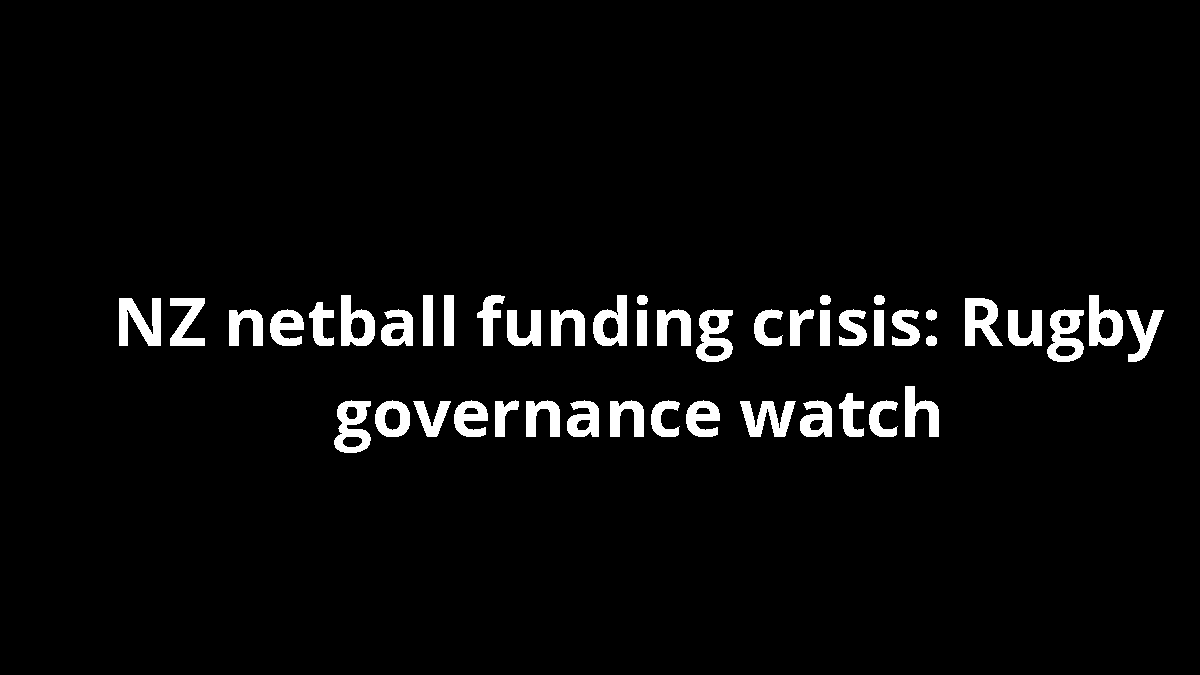NZ Netball Funding Suspended Pending Taurua Investigation
NZ netball funding crisis has become a focal point in New Zealand sport governance. The stakes extend beyond netball courts and coaching belts; they touch every corner of the country’s high-performance system. The NZ netball funding crisis has forced Sport NZ to pause funding while authorities scrutinize Netball NZ’s high-performance environment, and it has amplified questions about accountability, leadership, and fairness for athletes and staff. Observers note the NZ netball funding crisis exposes gaps in governance structures that have underpinned Kiwi elite programs for years, from selection processes to welfare policies. With Dame Noeline Taurua stood down pending the independent review, the NZ netball funding crisis now engages lawyers, commissioners, and national sports bodies as they weigh the balance between transparency and protection of athletes. The country watches how decisions will shape development pathways, funding stability, and the trust that underpins all team sport in New Zealand. The NZ netball funding crisis resonates beyond netball, prompting rugby observers to consider risk management in shared funding ecosystems.
Early indications from the independent review into Netball NZ’s high-performance environment have left many questions unanswered, but the outlines are clear: leadership change can be painful yet necessary for cultural renewal. The stand-down of Dame Noeline Taurua has intensified scrutiny on governance frameworks that govern most elite programs in New Zealand. Sport NZ’s pause in funding is not just a financial decision; it is a signal that the welfare of athletes and the integrity of coaching pipelines take precedence. In this uncertain climate, Netball NZ faces the dual challenge of maintaining competitive performance while rebuilding trust with players, staff, sponsors, and fans. While the immediate aim is resolution, the longer-term goal is to emerge with a more resilient, inclusive, and transparent system. For rugby audiences, these dynamics underline the importance of clear accountability and robust safeguarding practices across all codes. BBC Sport Rugby.
Background and Independent Review
- Independent review findings have implications for leadership and team culture across elite sport.
- Stand-down of Dame Noeline Taurua triggers governance questions at Netball NZ and beyond.
Funding and Governance Implications
- Potential reallocation discussions at Sport NZ affect multiple sports in New Zealand.
- Long-term funding models may be re-evaluated to ensure resilience of high-performance programs.
Sport NZ Urged to Resolve Funding Standoff Quickly
The pressure on Sport NZ to resolve the standoff promptly is mounting. Mark Mitchell publicly urged Sport NZ to bring the standoff to a swift conclusion, echoing a wider mood across the NZ sporting community that delays undermine both credibility and performance. The calls for speed are tempered by a demand for due process, ensuring any resolution does not skate over accountability. Meanwhile, stakeholders ask for concrete timelines, transparent decision-making, and safeguarding measures for athletes and coaches who rely on stable funding to maintain competitive edge. The conversation stretches beyond netball to a broader assertion that elite sport in New Zealand must inhabit a predictable funding environment to sustain its long-term ambitions. As discussions continue, rugby listeners and fans track how governance reforms across sports could set a precedent for cross-code accountability. World Rugby.
As timelines become focal, the importance of transparent criteria for funding decisions grows. Sport NZ and Netball NZ are navigating a complex mix of political scrutiny, sponsor expectations, and athlete welfare concerns. The outcome will influence how other codes allocate resources during periods of reform and how they communicate with communities that crave clear, timely updates. In rugby circles, patience is balanced with insistence on governance standards and performance transparency, a balance many hope will be mirrored across all codes in New Zealand. Moreover, the broader public discussion may spur reforms that improve resilience against future shocks and help maintain the integrity of high-performance pathways across sport.
Urgency and Timelines
- Strategic milestones and dates are demanded by stakeholders.
- Public statements must be timely and precise to avoid confusion.
- Funding decisions hinge on governance reforms that can be implemented swiftly.
Impact on Silver Ferns and NZ High-Performance Environment
The NZ netball funding crisis is not just a budget issue; it directly shapes the Silver Ferns’ preparation and the broader high-performance environment. Athletes face uncertainties about training programs, travel logistics, medical support, and access to resources that underpin international competitiveness. Coaches must adapt to tighter budgets while maintaining rigorous standards on the world stage. The environment that nurtures talent—from scouting and development to performance science—will be tested as financial lines tighten. For supporters, the key question is whether the ecosystem can preserve its culture of excellence while rebuilding trust with players and staff. In this moment, the NZ netball funding crisis also tests the resilience of leadership across sport, reminding everyone that excellence is inseparable from sustainable resource management. The scrutiny extends to how rugby programs manage similar pressures, offering a timely cross-code reference point for best practices. BBC Sport Rugby.
Pathways for athletes and staff require safeguards, welfare measures, and clear career development tracks. When funding is uncertain, injury prevention, mental health support, and athlete education become even more critical. The high-performance environment demands certainty about long-term commitments, not just short-term fixes. The NZ netball funding crisis underscores the fact that performance depends on an ecosystem where coaches, scientists, medical staff, and administrators collaborate under transparent rules. This moment serves as a reminder to rugby leaders that cross-code learning can strengthen governance that protects performers while delivering results on the field. The health of sport depends on sustained investment in people, facilities, and the infrastructure that binds them.
Impact on Athletes and Staff
- Performance cycles might become shorter or more demanding for athletes and staff.
- Staff retention could be challenged as resources tighten.
- Support staff’s roles may broaden to cover welfare and resilience training.
Governance and Funding: What Comes Next
Looking ahead, governance reforms are likely to become central to how NZ sport stabilizes funding and leadership. The coming changes will aim for clearer roles, stronger safeguarding, and robust financial models that can weather sponsorship gaps and audience shifts. A core objective will be to align accountability with athlete welfare, ensuring that elite programs remain financially sustainable even when revenue streams fluctuate. In practice, this could involve independent audits, standardized reporting, and formal performance metrics that guide investment decisions. The netball case may also prompt broader, cross-code conversations about governance architectures that support resilient pathways for all sports in New Zealand. The potential templates could influence rugby governance and help shield high-performance ecosystems from funding shocks.
As reforms emerge, stakeholders will seek a coherent roadmap that balances transparency with practical execution. The expectation is to see concrete reforms, clear timelines, and inclusive processes that bring players, coaches, supporters, and partners into the fold. In rugby terms, the goal is to translate governance lessons into concrete improvements—fewer ambiguities, more proactive risk management, and a stronger culture of accountability across all elite programs. Such changes could strengthen the overall health of sport in New Zealand and ensure that promising talent remains supported in a sustainable way.
Proposed Reforms and Funding Models
- Transparent annual reporting and independent audits are likely to become standard.
- Performance-based but sustainable funding cycles will be emphasized.
- Cross-code governance forums to share best practices could spread across sports.
Community Reactions and Path Forward for NZ Sport
Community reactions to the NZ netball funding crisis have been vocal and multi-faceted. Fans, athletes, coaches, and former players have called for accountability while stressing the importance of safeguarding the future of sport in New Zealand. In rugby circles, observers see this moment as a case study in governance and risk management, underscoring the need for shared standards across codes. Public sentiment emphasizes balanced reforms that protect athletes, preserve competitive integrity, and keep elite pathways open for the next generation. The path forward will involve improved communication, targeted investments in athlete well-being, and clear performance expectations that align with public trust. As stakeholders debate how to balance accountability with sustained support, rugby audiences will be watching how NZ sport navigates this transition and whether a model can emerge that other codes can adopt.
Public conversations are likely to focus on governance, funding stability, and collaborative approaches to sport policy. Voices from athletes may push for welfare-centric reforms that ensure resources reach those who need them most. Parliament and government partnerships could shape funding channels that reduce volatility and create more predictable cycles. The NZ netball funding crisis thus becomes a catalyst for broader improvements in how elite sport is funded and governed, with rugby watchers hoping for a framework that delivers consistent investment, rigorous oversight, and enduring excellence across all codes.
Public Sentiment and Long-Term Path
- Voices from athletes emphasize welfare and equitable access to resources.
- Evidence-based reforms and partnerships with government will shape future funding.
- Rugby remains vigilant about governance standards across elite programs.


